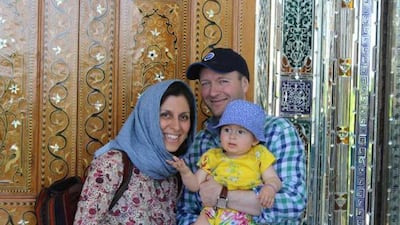Iran has been encouraged to step up its campaign of hostage-taking because of the “weak and ineffective” attempts by the UK to have its citizens released, the MP for Nazanin Zaghari-Ratcliffe has claimed.
In a damning indictment of efforts to help British passport holders detained in Iran, Tulip Siddiq called for an overhaul of the “failed approach” of diplomats working to release Britons held on trumped-up charges.
The UK’s ambassador to Iran told Ms Zaghari-Ratcliffe’s family that more Britons were unfairly held than any other Western nation, according to Ms Siddiq. Ms Zaghari-Ratcliffe’s campaign is aware of about 10 Britons who were held at the start of 2020.
Those known to be held include Anoosheh Ashoori, 66, a British-Iranian engineer jailed for 10 years for spying on Iran, and British resident Aras Amiri, who works for the British Council, which promotes education and cultural programmes.
Despite the broader human rights abuses of the Iranian government, the “murky and ultimately inadequate” approach by British diplomats is “central to the failure in securing her release,” Ms Siddiq wrote about Ms Zaghari-Ratcliffe in a submission to a parliamentary committee examining the UK’s relations with Iran.
“It has become a case of global renown, due to both the cruelty of the Iranian regime and the failures of Britain’s diplomatic approach in trying to secure her release,” she said.
“By playing softball in its attempts to secure the release political prisoners such as Nazanin, the UK has wasted any leverage that it may have had over the Joint Comprehensive Plan of Action [The Iran nuclear deal agreed in 2015] and has generally looked weak and ineffective.”
Ms Zaghari-Ratcliffe has been held since April 2016 and jailed for five years on unspecified espionage charges.
She is currently living at her parents’ home in Tehran after being given temporary release along with thousands of other inmates as Iran grapples with the coronavirus pandemic.
Unlike most freed inmates, she is being monitored with an electronic tag and has to remain within metres of her parents’ home.
British families have looked on in frustration after citizens of other countries have been released after prisoner swaps and secret negotiations with Iran.
Tehran has not publicly requested the release of any Iranians held in UK jails, but the failure of Britain to settle a £380 million (Dh1,740 billion) debt over an aborted 1970s arms deal has angered the regime and been cited by families as a block to their relatives’ release.
Ms Siddiq, an MP for the opposition Labour party, singled out Prime Minister Boris Johnson for criticism for his “very poor grasp” of the details of the case.
While he was foreign secretary, Mr Johnson made an “enormous mistake” linking Ms Zaghari-Ratcliffe with the teaching of journalism while she was in Iran. His comments were seized on by Iranian media and the judiciary as evidence for undermining the regime.
During the first meeting with the family, Mr Johnson asked her husband, Richard Ratcliffe, if he had “enjoyed his visit to Iran”, she said. Ms Zaghari-Ratcliffe had travelled alone with her daughter to Iran when she was arrested. The prime minister later promised to leave no stone unturned in efforts to secure her release.
“Beyond the false dawns, false promises and inconsistencies of the FCO’s failed approach to Nazanin, the importance of her case to this inquiry should extend far beyond her own personal suffering,” the MP said.
She said that the failure to settle the arms deal debt had risked future trade opportunities in Iran and put more UK citizens in danger.
The foreign office must “take a tougher stance on Iranian hostage-taking and prioritise the victims of this in its diplomatic efforts,” she said.
The temporary release of political prisoners during the coronavirus pandemic presented an important opportunity to change approach, she said.
“In my opinion, the UK’s existing approach is not in the prisoners’ interests nor is it in the national interest.”
A separate submission by rights group Amnesty International said there was “legitimate criticism” of the government’s support for dual-citizens in Iran.
“This includes failing to ensure prompt consular access and make their cases a priority, let alone calling for their release or charge them with an internationally recognisable criminal offence, until pressed to do so publicly by their families,” it said.
The UK said that it continued to lobby at the highest levels for the release of Britons holding dual citizenship but diplomatic staff were blocked from visiting them in prison. Iran does not recognise dual citizenship and views the prisoners as Iranian nationals.
A spokesperson for the UK's Foreign Office said: “We continue to urge the Iranian government to immediately release all arbitrarily detained UK nationals and allow them to return to their families. We have consistently raised their cases and will continue to do so.”


